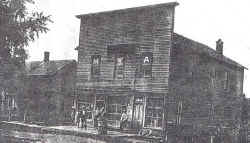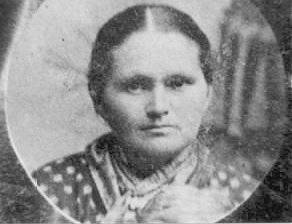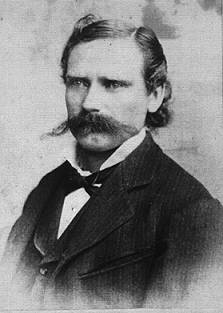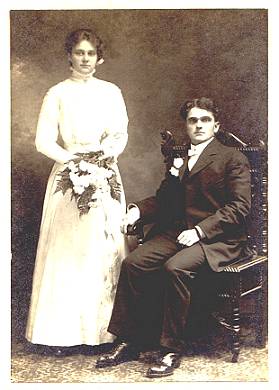|
JÁN HORAK, THE ORIGINAL SETTLER
Ján Horak was born about 1806 in Zárecí near Vamberk, Bohemia, which
was in the Austro-Hungarian Empire at that time, and now part of the Czech
Republic. Vamberk is about 80 miles east of Prague.
In the early 1830's he married Frantiska Jehlicka. To this marriage
were born eight children. In October, 1854, the family emigrated to the
United States landing in New York harbor. According to early accounts the
trip from the old country to the final destination could take many weeks.
It must have been quite an undertaking with 8 children.
The book Czech Immigrant Passenger Lists, New York, 1847-1869 lists the
following as having arrived on 2 October, 1854, on the ship “Elida”
from Bohemia via Hamburg: HORAK, Joh. 47, Franziska 44, Johann 18,
Josef 11, Franz 8, Anton 2, Maria 19, Franziska 16, Catharine 14, Anna 6.
(The spellings of the names are probably German spellings since it was a
German ship.)
In a biographical sketch from the History of Johnson County, Iowa on
Frank J. Horak (the above Franz, age 8), it states that “He came to Rock
Island by railroad and then to Iowa City in a wagon.” Another
biographical sketch written by Frank's daughter, Bertha Horack Shambaugh,
states that “His family came to America and settled in Johnson County in
1854, on a farm between Shueyville and Western near the Linn County line.”
An article “The Bohemians in Johnson County”, written in the early
1900's by B. Simek, a professor at the University in Iowa City states “...larger
numbers (of Bohemians) did not come until 1854, and the majority of these
settled in Jefferson township and the adjoining part of Linn county.
Purchases of land were made during that year by the following persons in
about the order named, as shown by county deed records. Anthony Sulek,
Francis Rigl, John Witousek, Joseph Renein, Anthony Kopecky, Joseph Coufal,
Joseph Dostal, Victor Barta, John Horak, Ignatius Stepanek, and Anthony
Pecka.”
Ján, hereafter referred to as John, purchased land from a Francis Rigl.
The land was in Jefferson Township, Johnson County, in two tracts; one in
the southeast quarter of the northwest quarter of section 14; and one of
fifty acres off the east side of the northeast fractional quarter of
section 2, township 81, north of range 7 west of the 5th principal
meridian. The Section 2 was where the family first lived and raised crops
and is located to the northeast of Shueyville. The Section 14 tract,
located south of Shueyville, was probably used for making wood for
building and heating, as it was (and in 2003, still is) largely wooded.
In order to imagine what it was like to be a settler, I quote from
Martha E. Griffith's The History of Czechs in Cedar Rapids,
1852-1942.
"After the purchase of a farm, the next task of the pioneer
families was to erect a house...Generally, because of the ample supply
of timber, houses were constructed of logs. ...Furniture for these early
homes was scarce. Beds consisted of bundles of straw placed on the
floor, on top of which were featherbeds brought from Bohemia in huge
chests... After the houses were constructed, land was cleared for crops.
Where brush was cut away, beets were planted and where stumps were
cleared, potatoes were planted."

Click for enlargement
H. Claude Horack and his sister Bertha M. H. Shambaugh in front of
the
original Horak log cabin built in
1854 in northern Johnson County, Iowa. Photo circa 1930's.
Since the family arrived in October, it is likely they spent
the winter building shelter and clearing the land. John appears on record in
the 1856 Iowa Census, Johnson Co., Jefferson Township, as John Horak, alien,
in the militia, owner of 20 acres of improved land and 70 acres of
unimproved land. He had raised 5 acres of spring wheat with a harvest of 100
bushels, 3 acres of corn from which he harvested 75 bushels, and 1 acre of
potatoes with a harvest of 75 bushels. He had also manufactured 20 pounds of
butter, so he apparently owned a milk cow. The census listing is as follows:
1856 Iowa Census, Johnson Co., Jefferson Township
John Horak age 50
Frances age 46
Mary (age missing)
John age 19
Frances age 17
Catharine age 16
Joseph age 13
(Frank should be listed here, but is missing)
Anna age 7
Anthony age 4
Four years later, the 1860 Census taken in Jefferson
Township of Johnson County lists John Horak, age 54, male, farmer, with real
estate worth $800.00, with a personal estate worth $400.00, and birthplace
in Bohemia. Frances, his wife in the previous census, does not appear here.
We can only assume that she died.
His children are listed as :(1860 Census)
Mary age 25
ohn age 24
Francez age 22
Catharine age 20
Joseph age 18
Frank age 15
Anna age 12
Anthony age 8
From the above 1860 census, we assume that John Horak is now
a widower. He has three grown daughters, 1 grown son and two teenage sons to
help with the farmwork and the care of the younger children. The homestead
was within walking distance of Western (which was then a settlement) and
Shueyville. Later on, son Joseph ran the general store in Shueyville, and
son Frank was postmaster in Shueyville for a short time. Frank also attended
Western College, which was within walking distance of the farmstead.

Click for enlargement
The General Store in Shueyville, Johnson County, Iowa,
which Joseph Horak operated for a time.
The following quote from "The Bohemians in Johnson
County", by B. Simek, gives us a flavor of the times and the area in
which these original Horak immigrants lived.
"The first permanent settlement was made in the
northern part of the county and centered in Jefferson township in this
county and College township in Linn county. The majority of the older
settlers in this section came in the years 1854 and 1856, but stragglers
followed for many years after. These people left their native land during
the period of political disturbances which followed the revolutionary
outbreaks of 1848 and
1849, the period of great awakening among European
nations. The oppressed of all nations were demanding their rights and the
Bohemians, who had borne the oppression of the Austrian government for
several generations, joined in the general uprising. The partial collapse
of this effort made exiles of many of those who had taken part in it, and
the industrial depression which followed caused many more to leave their
native land.
The spirit with which these people entered upon their
duties in the land of their adoption may perhaps be best understood by a
brief reference to the history of the "Slavonic Political
Society" which was organized at the home of Mr. John Witousek near
Shueyville, March 5, 1863, and the records of which are still preserved.
(My note - John Witousek was a next-door neighbor to John Horak.) By this
time the older settlers had become citizens of this country, the first
application for naturalization papers, so far as the records of Johnson
county show, having been made by John Witousek, August 17, 1854, others
following rapidly. The privilege of free citizenship, which had been
denied to them in their native country, was so highly prized that few
permitted delay in securing it. ...The object of the society was to
discuss political questions and thus gain the necessary information for an
intelligent exercise of franchise.....No body of foreigners ever received
the rights of American citizenship with a deeper appreciation of their
duties, and the writer knows from personal experience that it was an
inspiration in later years to listen to the fervid utterances of some of
these men who had suffered so much in their efforts to secure the right
which they finally enjoyed. These were strong men and good citizens, and
no taint of anarchy marred their concept of a government for the people.
As noted, the original settlement in the northern part of
the county centered in Jefferson township, but extended far beyond its
limits. The first settlers came either by way of Iowa City, or directly
across the prairies from Racine, Wisconsin, which was the starting point
for the ox-team caravans which crossed the prairies to (Iowa) before the
railroad crossed the Mississippi river. ...They came with limited means,
and partly for this reason, and partly because in their native land they
had been accustomed to comparatively small tracts of ground, they
purchased small tracts of cheap land which had been practically exhausted
by earlier settlers, or acquired prairie which was then still considered
of little value. But it is noticeable that they soon acquired land and
built their own homes, and this home-making quality has characterized the
Bohemian people of every class and kind who have come to this country.
...This northern colony has furnished Johnson county and
the state, more or less directly, with a long list of useful servants. In
this list are three professors of the State University (Iowa City)
(Professors H. Claude Horack, and Assistant Professor Frank E. Horack and
B. Simek.)...The first Bohemian to practice law in the county was Frank J.
Horak, a graduate of the College of Law of the State University..."
The Frank J. Horak referred to is John Horak's son, and H.
Claude Horack and Frank E. Horack are Frank J.'s sons. At some point this
branch of the family changed the spelling of their surname, perhaps to
"Americanize" it. The correct spelling in Czech is Horak, with a
long accent over the “a”.
The following is taken from a biographical sketch of Frank
J. Horack, written by his daughter, Bertha M. H. Shambaugh (Mrs. Benjamin
Shambaugh) for A Bohemian's Who's Who in 1916. "The log cabin in which
he lived as a boy still stands. It was a Bohemian community and there were
many evening gatherings in the log cabin living room for the study of the
Constitutions of the United States and of Iowa, all with a view to becoming
familiar with American ways - the better to prepare themselves for
citizenship in the adopted country."
John’s occupation on the ship Elida’s passenger list is
stated to be “farmer”. He must have had some resources in order to be
able to bring a family of 8 children across the ocean on a ship, on a train
from New York City to Rock Island, Illinois, then by wagon to Iowa City, and
still have enough money to buy land. He was 47 and his wife 44 when they
emigrated, and they had children that were nearly grown. They probably
wanted to provide their children with a better future than they would have
had in the old country.
John and Frances Horak's Children
Mary, the oldest
daughter, married Wencil Rigel in Iowa City in October of 1860. This family
lived mainly in Linn County. (Click for more on
this family)
On December 31, l860, Jan's second daughter, Frances,
married Joseph Dudek in Linn County. In 1879, the Dudeks moved to Red Willow
Precinct, Red Willow County, Nebraska, near the town of McCook arriving in
May 1879. Frances Horak Dudek died about a year and a half later, on
November 1, 1880 at about age 40.

Click to enlarge
Frances (Horak) & Joseph Dudek with child.
Photo courtesy of Marilyn Barnett, great-grand-daughter.

Click for enlargement
The sod home that Joseph & Frances
Dudek built in Red Willow County, Nebraska near the town of McCook.
L-R: Joseph & Eliza Dudek (Joseph's 2nd wife), Pauline & Allen
Austin Phillippi, George Lincoln & Sarah Phillippi, Theodore
Marshall & Alice Phillippi, Benjamin Washington Phillippi
(The Phillippi men are step-sons of Joseph Dudek). Photo and
identities courtesy of Marilyn Barnett, daughter of Lela Harrison,
who was a granddaughter of Joseph and Frances (Horak) Dudek and
did genealogy research on the Horak family for many years.
John, the oldest son, married Matilda Novak on February 17,
1862 in Johnson County and farmed near Ely, Iowa.
Catherine married
John Vidra on December 28, 1865.
Joseph married Anna Smejkal on October 4, 1866. Joseph ran
the general store in Shueyville and the family settled on a farm south of
Cedar Rapids in Linn County in the 1870's, just west of what is now Prairie
High School. His descendants still own
the original farm in 2006.
|

|

Joseph Horak (left) and his wife, Anna
Smejkal |
Anna married J.E. Dolezal in 1868 and lived in the town of
Ely, Iowa.
Frank married Katherine Mosnat in 1870 and lived in Belle
Plaine, Iowa. He attended the college of law at the University in Iowa
City, and later moved his family to Iowa City where he had a law
practice.

Frank J. Horak
photo courtesy of Sabra (Horack) Petersmann
Anton, the youngest, was married to Filomena Hromek. Anton
was the first blacksmith in Ely, Iowa. Anton died in 1886 and
Filomena died the following year, leaving their two young children orphaned.
Anton and his wife are buried in Sulek Cemetery, a mile south of the Horak
homestead in Jefferson Township, Johnson County, Iowa.
Records show that at least two of the sons, Joseph and Frank
served in the Civil War, enlisting in 1862 and 1864 respectively.
THE DEATH OF JAN HORAK
The following notices appeared on April 3, 1873 in the SLOVAN
AMERIKANSKY, a Czech newspaper which was published in Iowa City.
These have been translated from the Czech language as follows:
DEATH ANNOUNCEMENT: ELY, IOWA. Saturday
morning, 29th March, l873, my loving father-in-law, Jan Horak, died from
several weeks of illness. He will be remembered. Rest in
Peace. J.E. DOLEZAL
TO ELY, IOWA, AND VICINITY: Announcing to all
friends the unexpected death of my father-in-law, Mr. Jan Horak. The
funeral will be postponed to April 15 on account of the weather. J.E.
DOLEZAL
John Horak's will is as follows:
Linn County, Iowa Records - PROBATE RECORDS Vol. 12,
Page 27,28
Estate of John Horak, dec'd - WILL
In the Name of God. Amen.
I, John Horak, Sen., of Ely, Linn Co., Iowa, being in ill health and of
sound mind and memory, being desirous of settling my worldly affairs and
directing how my Estate shall be disposed of after my decease, while I
have strength and capacity so to do, do make and publish my last Will and
Testament.
My will is that all my just debts and funeral charges by my executors
hereinafter named be paid out of my estate as soon after my decease as
shall by them be found convenient.
I give and bequeath my farm of 60 acres, described as follows, West
half of the West half of the NE quarter Section 30 Twp. 82 North of Range
7 West. 40 acres. And the East half of the North West quarter Section 30
Twp. 80. 20 acres in the Co.of Linn State of Iowa to be equally divided to
and among by beloved sons and daughters, as follows:
John, Joseph, Frank, Anton, Mary, Frances, Catherine and Anna. To them
and their use and behoof forever. John Horak I give devise and bequeath to
my son Anton one promissory note of four hundred dollars ($400) on Jos.
Cervenka, and in favor of John Horak, Sen., dated the 12 day of December
1871, and due 18 months from date and secured by a mortgage of even date
with said note, on land described as follows: The South West quarter of
the North West quarter, Sec. 25 and South East quarter of the North East
quarter Sec. 26 Twp 82. Range 6 West 5th P.M.
I give and bequeath to my son Joseph one promissory note of two hundred
dollars ($200) against Joseph Hruska and in favor of John Horak, Sen., and
secured by mortgage of even date with said note on real estate owned by
said Joseph Hruska as described in said mortgage.
I also give devise and bequeath to my son Frank J. Horak and my
daughter Frances, one promissory note of ($400) four hundred dollars on my
said son Frank J.Horak and in favor of John Horak Sen., dated Apr 3, 1872
and due Sept. 1st 1872, and secured by a mortgage of even date with said
note, on real estate owned by said Frank J. Horak and situated in the town
of Belle Plaine, Benton Co., Iowa, to be equally divided between my said
son Frank J. and said daughter Frances.
John Horak
Lastly I do nominate and appoint my son Joseph to be the
executor of this my last will and testament.
In testimony whereof I, the said John Horak, Sen.
have to this my last Will & Testament, contained on 3 sheets and to
every sheet whereof subscribed my name and to the last sheet thereof I
have here subscribed my name on this twenty-seventh (27th) day of
March A.D 1873 One Thousand Eight Hundred & Seventy Three.
(signature) John Horak, Sen.
WITNESSES:
J.E. Stansberry, Western, Linn Co., Iowa
A.J. Fuhrmeister, Ely, Iowa
Joseph Woitishek at Ely
John K. (unreadable)
Although John's son, Joseph was appointed Executor in the will, John's
son-in-law, Wencel Rigel, acted as Administrator of the Estate. It is
interesting to note that the will was signed only 2 days prior to John's
death. The will on record is probably a copy or translation of the
original will, because the signatures of the witnesses are in the same
handwriting as the body of the will.
Apparently John had accumulated enough wealth to be able to make loans to
Joseph Cervenka and Joseph Hruska, whose notes he signed over to his
children Anton, Joseph, Frank and Frances. He also had loaned $400 to
his son Frank to buy property in Belle Plaine, Iowa, where Frank lived
before attending law school and setting up a practice in Iowa City.
The land described as "my farm of 60 acres" is located where the
Cedar Rapids Airport now stands. He apparently had sold the original
homestead and bought this piece of land at some point. Further search of
land records should verify this.
It is, at present, unknown where John Horak and his wife, Frances, are
buried. It could be that since we believe Frances died pre-l860, that the
gravestone is no longer readable. There were few cemeteries in the area at
that date and early settlers often buried relatives on their own land. Many
of the area cemetery records contain references to unreadable gravestones or
markers, and there is some reference to burial plots that are no longer in
existence. A elderly relative states that she has seen the grave of John and
Frances in Sulek Cemetery, but this has not been verified by records.
They do not appear in any church records in the area.
In the ledger book that John's son Joseph kept when he ran the general
store in Shueyville, there is an entry referring to the father's death. It
is written in Czech in elegant longhand and translates as, "Father Jan
Horak died 29 March LP (in the year of our Lord) 1873. John had
attained the age of 67 years, having lived in the United States for the last
20 of them. He had lived long enough to see his children married, with farms
or occupations of their own, and to be blessed with many grandchildren. He
had lived through the years of the Civil War, sending one son, Joseph, off
to fight for 3 years, and another, Frank, through a short enlistment. He,
along with many other original settlers had wrested a living from the
prairies and built a life for his family in the new land.

Copy of Hamburg departure record showing "Zaretsch" as Ján
Horak's birthplace
** Note: recent research has revealed that Ján Horak
listed his birthplace as a small village just to the northwest of
Vamberk called Zareci (diacritical marks absent). This appears as “Zaretsch.”
in the “Staatsarchiv Hamburg, Auswandererlisten VIII A1 Band 6”, a list
of people departing on ships from Hamburg. In Czech it is pronounced
very similar to Zaretsch, but with an "i" at the end, pronounced
as a long "e". On one of Joseph Horak’s Civil War
enlistment papers he states that he was from Womberg, which is the German
spelling of Vamberk, and in pension records he states that he is from
Vamberk.
The below are photographs of Jan's Grandson,
Thomas Horak and Great-grandson, Lester Horak
|

Otilla Holets and Thomas G. Horak
|

Lester Horak and Lillian Pelisek
|
It is interesting to note that even though my father-in-law,
Lester Horak, was the 4th generation in this country, he still retained and
spoke the Czech language, as well as English.
Composed by Barbara Horak, daughter-in-law of Lester Horak, son of Thomas
Horak,
grandson of Joseph Horak, great-grandson of Ján Horak.
last edited August 5, 2006
Return to the Horak page |








